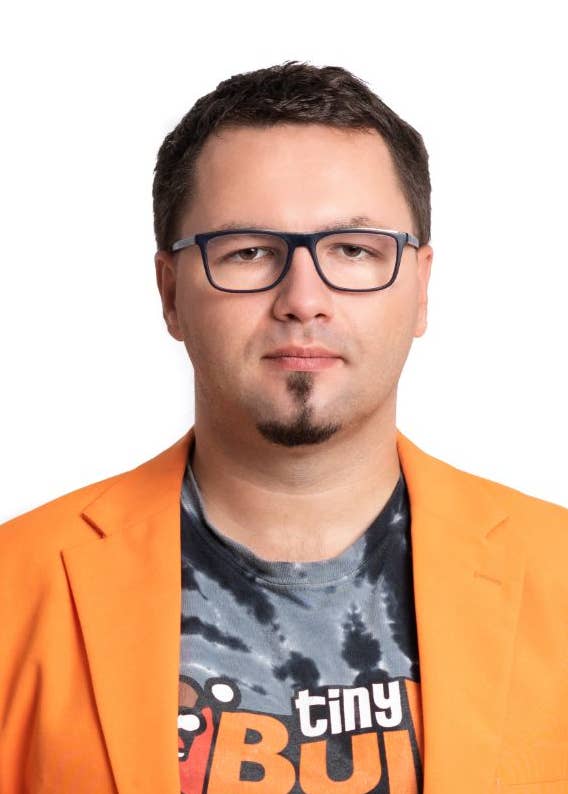TinyBuild's complementary acquisition of Versus Evil
Company heads Alex Nichiporchik and Steve Escalante on why the two indie publishers are coming together
Over the last few years, it feels like a new indie publisher is announced almost every week. It is far rarer for one such publisher to buy another.
At the tail end of November, Hello Neighbor publisher TinyBuild announced it has purchased RPG specialist Versus Evil and its QA subsidiary Red Cerberus in a deal worth up to $31.3 million.
Speaking to GamesIndustry.biz, TinyBuild CEO Alex Nichiporchik says this type of expansion is part of the strategy the company laid out in March around its £340 million IPO.
On why his company targeted Versus Evil, Nichiporchik speaks of his long-running respect for general manager and founder Steve Escalante, as well as his team, adding that it enables TinyBuild to bring even more games to market. Throughout both the official announcement and our conversation, he refers to TinyBuild and Versus Evil as "complementary" publishers.

"There is always a natural limit to any publishing label, so both from a consumer and a developer perspective," he explains. "Last year we launched five games. This year we'll have launched roughly double. So, launching at one game a month is the sweet spot -- which is why for companies like Bad Pixel, the developers of Deadside, we didn't really put the TinyBuild label on it, because we want the developers to be that publishing label.
"To continue expanding, it just makes sense to have a very defined target audience publishing label as part of the group. I think that's one of the reasons why we don't compete."
Versus Evil will continue to operate independently under TinyBuild, with Steve Escalante still in charge. Escalante tells us the acquisition was approached with the attitude of "If it ain't broke, don't fix it" and assures that Versus Evil will continue to sign games under its own label. But if that's the case, and given Versus Evil's solid reputation as an indie publisher, why sell at all?
"It just felt like a fit because Versus Evil had a pretty specific focus, has a very good reputation with roleplaying games and turn-based strategy games, and those types of things, and TinyBuild has just built an amazing brand going after some of the wider audiences with their products," says Escalante. "And in many regards, we don't compete but we just complement each other really pretty quite well."
"We want to build something very long-lasting in terms of franchises that are going to survive us as a generation"
Alex Nichiporchik, TinyBuild
He continues: "I love my investor group, they've been so amazing to work with for me for these last eight years, but we went about as far as we could go. In order for Versus Evil to get to the next step, we needed to line up some good partners and some capital to continue to grow. We're very proud of the progress we've made. We're very proud of the company we've created. But I love this business, I want to keep working, and we're talking with Alex and his team, this just seems like the next best thing for us to go to the next level. It just felt right."
Versus Evil is best known for its RPGs, such as Stoic's The Banner Saga games and Obsidian's Pillars of Eternity. This opens up a market TinyBuild has yet to tap into, but equally it makes sense to retain the Versus Evil name that has already built up so much goodwill with consumers in this space.
Escalante adds that TinyBuild branching into the genre itself or hiring new specialists to establish the publisher as a home of good RPGs would be considerably more challenging, especially given the uphill struggle so many indies face.
"What indie companies do, and I've said this over the years many times, is harder," he explains. "Every time we've launched a new game, we are establishing a new audience, and that is very, very difficult to do. You're establishing a new IP, a new brand, all those different things.
"Where TinyBuild has always excelled is by extending those brands, and a great example is with their Hello Neighbor franchise. And those are things that, again, from a complementary point of view, is we have experience with working with big teams, like we've worked with Obsidian and Stoic and others, and they have great experience of taking successful brands and turning them into successful franchises."

While Versus Evil is undoubtedly the bigger name, it's important not to understate the value of Red Cerberus as part of the acquisition. The Brazilian studio automatically more than doubles TinyBuild's headcount with its 250 staff and brings a wealth of different skills and experience to the company.
Nichiporchik cites two advantages to acquiring Red Cerberus; firstly, having an internal testing facility, especially one with so many people on board, enables TinyBuild to better support its developers.
"A lot of the issues that we have seen in the past year or so, and especially this quarter with video game launches, is that... if you think about it as a supply chain, we need to get testing, we need to get porting, we need to get localisation, and those are things that are not done in most larger studios even. And by having those resources in-house, you open up a lot more flexibility for that."
Secondly, he adds, it unlocks key connections to the growing South American market: "We've seen a few really great titles come out of there at small scale, and we believe that by having a footprint in the region, we're going to be able to help accelerate the development of the game development scene within that region, and also have some insights into that.
"Very early on, we invested into Eastern Europe and that has been really fruitful for us. It's still paying dividends in terms of really great talent at a very efficient cost, and we are expanding that growth into South America via Red Cerberus."
Looking forward, Nichiporchik doesn't give away too much about TinyBuild's future M&A plans, but does stress that any future acquisitions will need to fit in with the company's current strategy.
"We want to build something very long-lasting in terms of franchises that are going to survive us as a generation," he says. "Enhancing internal development capacity to be able to deliver on that vision, having additional publishing labels, having in-house services, having regions with emergent markets in terms of development, all of those things, they feed into that strategy.
"We're looking at a very wide range of targets, but what I don't want to do is just acquire companies for the sake of acquiring them."









